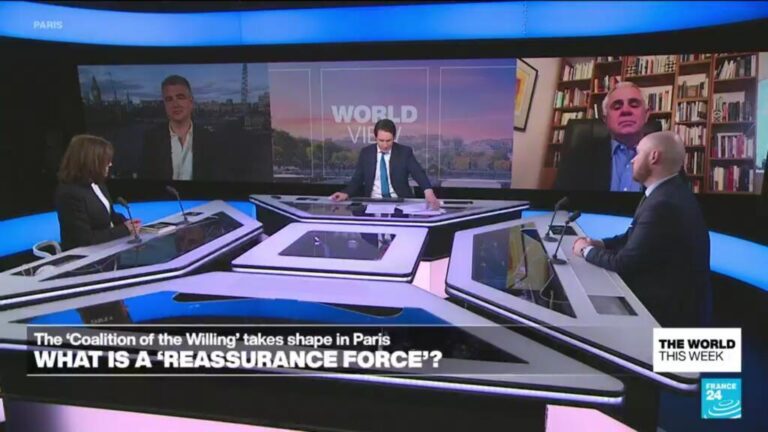Labeling Mexican cartels as “terrorists” could expose US companies to sanctions.
Former government officials and analysts say President Trump’s designation of Mexican cartels and other criminal organizations as foreign terrorists could force some American companies to avoid doing business in Mexico rather than risk U.S. sanctions, which would have major implications for both countries. can given their deep economic dependence.
The executive order, signed by Mr. Trump on Monday, It is intended to exert maximum pressure on Mexico to curb his dangerous drug trade. The designation also gives his administration more power to impose economic sanctions and travel restrictions, and potentially even conduct military operations in foreign countries.
However, disentangling cartel operations from US interests in Mexico can be quite complex. Mexico is the largest trading partner of the United States commodity and many American companies have manufacturing operations there.
Complicating matters is that these criminal networks have extended their operations far beyond drug trafficking and human smuggling. They have now penetrated a wide swath of the legitimate economy, from avocado farming to the nation’s billion-dollar tourism industry, making it difficult to be entirely certain that American companies are insulated from cartel activity.
Samantha Sultoon, senior adviser on sanctions policy and threat finance in the Trump and Biden administrations, said: “It’s been brought up in previous administrations across the political spectrum and by members of Congress who want to do it.”
“But no one did because they looked at what the impact would be on the trade, economic and financial relationship between Mexico and the United States,” he said. “They all came away thinking that such an appointment would actually be far-fetched and ill-advised, even though previous administrations viewed U.S.-Mexico relations very differently than the incoming Trump administration appears to have.”
Foreign terrorist designation can result in severe penalties for companies and individuals found to have paid ransom or extortion payments, including substantial fines, asset forfeiture, and criminal charges. American companies may also be ensnared in default payments made to cartel-controlled Mexican companies without the American companies’ knowledge.
Some extortion payments, even if made under duress, can be considered “material support” for cartels, said Pablo Zárate, managing director of US firm FTI Consulting. report reveals some of the risks of terrorist designation.
Given the tens of thousands of people involved and operating in various industries, including the hotel and agricultural sectors, former US officials and analysts have stressed that it will be nearly impossible to determine which businesses operate or are associated with cartel members. Cartels use the legitimate economy to launder money, which can mean that workers at a resort or an avocado packing company may technically be on the cartel’s payroll, but not know it.
As a result, companies in the risk-averse American financial sector may, for example, simply refuse to transfer money to a Mexican factory or transfer money between personal accounts to facilitate cross-border production and trade.
“Banks can turn away customers because they’re not worth the risk if they have ties to Mexico,” said Eric Jacobstein, a former State Department official in the Biden administration.
Fabian Teichmann, a Swiss lawyer and terrorist financing expert, said banks may ultimately decide to avoid all sectors perceived as high risk. Mr. Teichmann pointed to Mexico’s avocado trade, which is owned by the cartels they expanded their activities dramaticallyas an area that could bear further investigation.
“Banks can say, ‘We don’t want to be anywhere with what are considered terrorists, so we want to avoid that risk,'” Mr. Teichmann said. “From the bank’s point of view, it would be a very reasonable decision.”
Other types of financial institutions that facilitate payments between the U.S. and Mexico, such as Venmo or PayPal, which Mr. Trump’s close confidant Elon Musk helped found, could also be affected.
Mr. Teichmann said the terror label could further shadow large parts of Mexico’s economy, where cash is used instead of electronically traceable transactions, making it difficult for investigators to probe the cartels’ financial structures.
“If people can’t bank legally, they run to underground banking systems,” Mr. Teichmann said.
In 2024, the US Chamber of Commerce surveyed 218 companies and found that 12 percent of respondents said “organized crime has partially taken control of the sale, distribution and/or pricing of their goods.”
The multinational banana producer was Chiquita Brands He was brought to justice in 2024 for killings by a Colombian right-wing paramilitary group known as a terrorist organization. Chiquita Brands said it was extorted by a paramilitary group and forced to pay to protect its Colombian workers. However, the plaintiffs alleged that the company paid the paramilitary group to buy land for residents at low prices.
Designating terrorists would also hurt American companies that are firmly north of the border but rely on Mexican labor. The designation is so broad and vague that farms in Texas or farms in California could face penalties if their employees send money transfers to family members involved in organized crime in Mexico.
If money transfer companies like Western Union also halt operations to Mexico due to concerns about proper vetting of Mexican customers, it could affect money transfers that the country relies on. This would be devastating to the Mexican economy $63.3 billion in remittances in 2023it is about 5 percent of the country’s gross domestic product.
A foreign terrorist designation could also allow the United States to deploy forces inside Mexico against criminal organizations without the consent of the Mexican government, as it has done in Afghanistan and Syria.
But Afghanistan is occupied by the US and the Syrian government has lost control of most of its territory in recent years. This gave Washington some protection under international law for the American military to deploy troops and launch special operations to kill or capture terrorist leaders in those countries.
However, Mexico has been cooperating with the United States for more than 30 years to fight cartels. Mexico may threaten to end cooperation if the United States is seen to be violating Mexico’s sovereignty. When US federal prosecutors office was arrested The Mexican government, a former Mexican defense minister during Mr. Trump’s first administration, has suspended all cooperation with the US Drug Enforcement Administration.
“A unilateral move would be catastrophic,” said Craig Deare, a former U.S. military attaché at the U.S. Embassy in Mexico in the 1990s.
“It would undo decades of cooperation and efforts by Republicans and Democrats to build a defense relationship with Mexico,” he said, adding: “If you don’t like cooperation now, wait until Mexico cuts all ties.”
On Tuesday, Mexican President Claudia Sheinbaum issued a stern warning to Mr. Trump during his daily news conference. “We will always defend our sovereignty,” Ms. Sheinbaum said. “We all want to fight the drug cartels, that’s obvious. So what should we do? We must coordinate efforts; we must cooperate,” he said.
“Let them know that the president of the republic will always defend Mexico above all else,” the Mexican president added.







